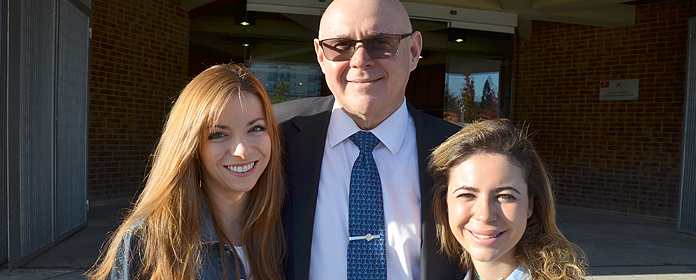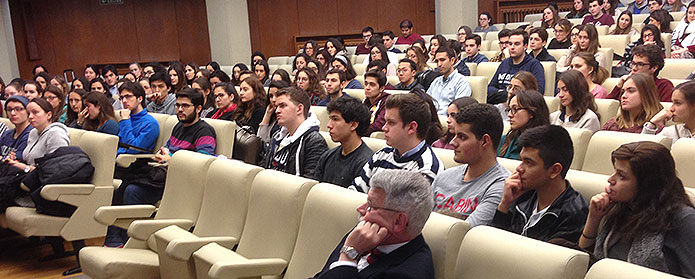A Summer at the Mayo Clinic
This summer, two students of the School of Medicine have been practising at one of the most prestigious hospitals in the United States

Elvira Díaz and Natalia Díaz, two fifth-year students in the School of Medicine at the Universidad de Navarra, are here in the cafeteria of the Science Building together with Professor Héctor Robles (MD, MPH), an eminent doctor visiting from the Mayo Clinic. They address each other informally with the cordiality of those who have worked together, and it is clear that they all know each other well. The students, although they have the same surname, are not actually sisters; they now share the precious experience of what it is to learn medicine in a foreign land.
"It has been a very pleasant surprise for me," says Robles. "Five years ago the idea of inviting students from the Universidad de Navarra to perform clinical rotations at the Mayo Clinic came up, and the experience has been very positive." His relationship with the School of Medicine began when, in 2012, he started to teach the optional subject "Clinical Cases in Neuroradiology," a subject within the International Program. Since then, the foundations of an agreement between the Mayo Clinic and School of Medicine, which he considers to be "one of the best faculties in Spain," have been established.
For Elvira Díaz the rotation all began, perhaps, with verbal recommendation: "I knew people who had been in the United States doing internships and they advised me to take advantage of the experience," says Elvira. "Preparations for the trip seemed interminable: vaccines, paperwork, finding accommodation ... but it was worth it," adds Natalia. The minimum requirements that a student must meet to spend their summer in this exceptional manner are not very demanding: "the student must be in the fifth or sixth year and must undergo an interview to assess their level of English."
Jacksonville, one of the largest cities in North America, is located in Duval County, northeast of Florida. This is where our students were headed. "I was in a house shared with other international students, and I was very comfortable there. I was able to spend a few days to get to know the basics of the city before starting with the medical practice," says Elvira. "I arrived a week later, and Elvira helped me a lot to get to know the city. I also met Héctor Robles and his wife, who also made my arrival easier," says Natalia.
ObservershipsThen the practical work experience begin, Elvira in surgery and Natalia in the emergency department. Both students had the same impression: "Although we were only doing observerships, they were always looking out for us at all times. They showed real interest in us learning."
The five years that Professor Robles has been involved with the Faculty of Medicine are sufficient for him to review how students have developed and progressed: "They are very competitive relative to the US level, for me it is a privilege to be a mentor for them. Even for those who have already graduated, since I keep in touch with some of them." In addition, he has a certain mission in mind: "I think one of the main skills that a doctor must have is to be a leader. A doctor must have the ability to behave and speak in public, and that is something that I want to teach in my classes and tutorials." This year has seen the launch of a series of personalized tutorials with students entitled And then what? Here is where Héctor Robles advises any students who ask for an appointment on how to approach their professional future.
I ask Elvira and Natalia the inevitable question: "Do you know what specialization you want to do?" Elvira replies, "I will do the MIR in Spain and then STEP 2 (USMLE) in the USA. Then I'm torn between neurology and emergency attention if I go abroad. If I end up working in Spain, it's something surgical." Natalia answers, "In my case, also, something surgical, maxillofacial, plastic or general surgery ... whether here or in the United States."
As we leave the cafeteria, the students offer a word of recommendation for anybody who likes the idea of a foreign rotation but is also daunted by the prospects: "It is best to shake off your fear and go for it. It is something unique that you really just have to experience."


